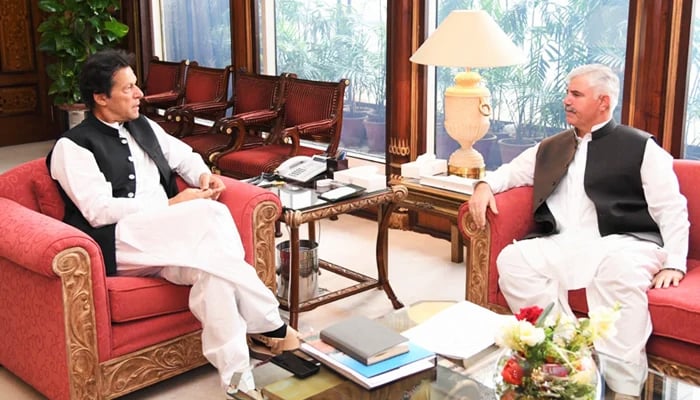After Punjab, KP Assembly to be dissolved on Tuesday
In line with PTI Chairman Imran Khan's directives, KP CM to send summary on Jan 17
KP Chief Minister Mahmood Khan — who was awaiting orders — has received directions from PTI Chairman Imran Khan to send the summary for the assembly's disbandment to the KP governor, Haji Ghulam Ali.
The provincial chief executive will send the summary under the Constitution's Article 112 to the governor, and if Ali decides against signing it, then the legislative will automatically dissolve after 48 hours — which is expected on Thursday.
"God willing, the Tehreek-e-Insaf will again form its government [in KP] with a two-third majority," CM Mahmood wrote on his official Twitter handle on Sunday.
Defending the PTI chairman, the KP chief executive said that Imran Khan had “sacrificed” his governments for the sake of the country.
“[Khan] will soon be the prime minister,” he added.
Mahmood further said that the people of Pakistan had finally come to the understanding that getting rid of the self-interested political mafia was of paramount importance.
“We will complete the journey of development which was started under the leadership of Imran Khan,” he also said.
In a similar situation, Punjab CM Parvez Elahi sent the summary to the governor, Baligh Ur Rehman, for the assembly's dissolution on Thursday. However, Rehman refused to sign it, and the legislative was automatically dissolved on Saturday.
The PTI chairman had announced the dissolution of the assemblies — Khyber Pakhtunkhwa and Punjab — in November last year. However, the plans were delayed due to consultations with allies and countermeasures adopted by the ruling allies in the centre.
The Pakistan Democratic Movement (PDM) had been repeatedly calling on the PTI to dissolve the assemblies since its announcement, and it seems that it is also gearing up for elections now.
But just like there were hurdles or reservations in Punjab, a majority of PTI lawmakers in KP are also not in favour of the dissolution of the provincial assembly and losing their stable government, according to The News.
“I don’t know who has advised the party Chairman Imran Khan but it’s not a wise decision. It’s neither in the interests of the party nor in favour of the province," a minister, who wished to remain anonymous, told The News.
"The PTI has a stable government in KP and it should have been allowed to continue till the general elections in the country,” the ruling party's minister told the publication.
Caretaker govt and polls
At first, the governor sends letters to the chief minister and leader of the opposition in the provincial assembly for the appointment of a caretaker government.
However, if an impasse, between the two leaders — CM Elahi and Hamza — lasts for three days over the appointment, then the speaker will form a committee comprising six members of the outgoing assembly with equal representation from the treasury and the opposition.
To the committee, the CM and the leader of the opposition will forward two nominees each.
The committee then will have three days to evolve consensus on one name. If that fails as well then the names of the nominees will be referred to the Election Commission of Pakistan (ECP) for a final decision within two days.
The selected nominee will perform their duties as the interim CM until the formation of a new government in the province. The interim CM also has the power to induct his own cabinet.
Following the placement of a caretaker chief minister, the election commission is bound to carry out general elections in the province within 90 days.
The electoral body can hold polls within 22 to 45 days because constitutionally it requires at least 22 days to scrutinise the nomination papers of the candidates.
The candidates will be given 29 to 30 days to run the election campaign. Considering such a timeline, it is possible that the ECP may conduct the polls between March 1-April 10.
-
Security forces gun down 30 terrorists in multiple IBOs in KP: ISPR
-
MQM-P calls for new province in Sindh
-
US report validates Pakistan military edge over India: PM
-
Banned TTP poses serious threat to Pakistan security: UNSC panel
-
CM Afridi clarifies remarks on by-poll after ECP requests army deployment
-
Dubai sees 3.2m Pakistani passengers in 2025 as airport sets new milestone
-
Security forces kill 23 Indian proxy terrorists in KP's Kurram
-
Pakistan to construct island to boost oil exploration: report












